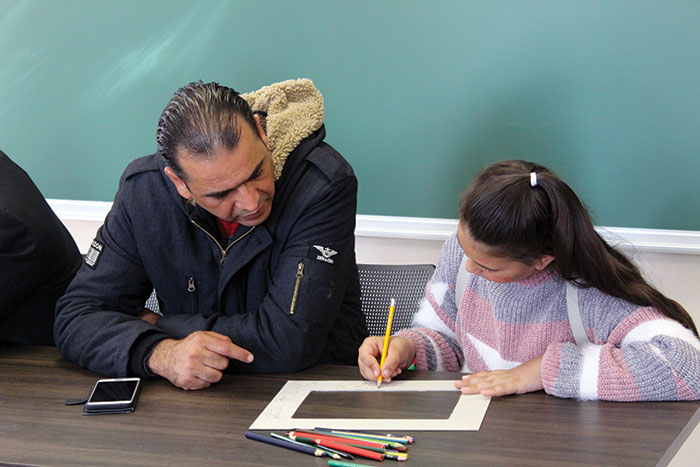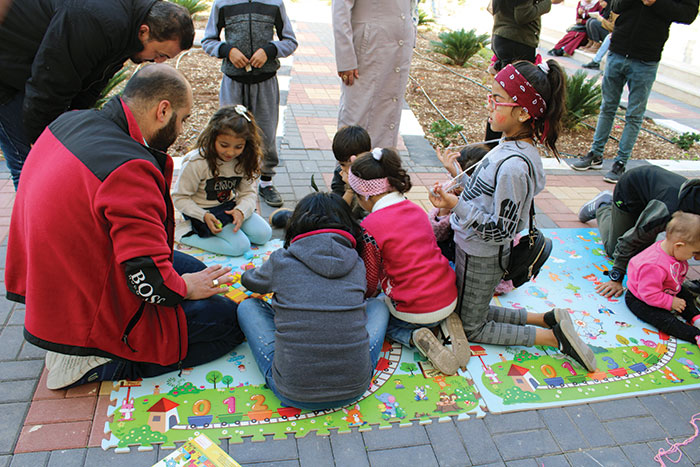In this article, Sara addresses the concept of knowledge as it relates to everyday practices and presents an example of how they use posters as a means of restructuring knowledge and its circulation.
A person’s knowledge is determined by their everyday experiences, relationships with others, self-experiences, adventures and reading. We can divide knowledge into two forms:
- based on self-interests and desires, and
- related to exposure to knowledge consciously and unconsciously through engaging with communities.
Developing committees
In 2010, the Tamer Institute launched the Abi Aqra Lei (My Father Reads to Me) campaign, as a result of over 10 years of working to address a range of social and educational issues. It involved the production of visual materials for community engagement. The campaign focuses on fathers who are often stereotyped as playing specific roles in educational processes. The unequal sharing of roles and tasks within the social structure of the family, means that a father’s role is sometimes seen as one of absolute authority and as a source of fear.
As part of the campaign, the Tamer Institute collaborates with artists, writers, community animators, journalists and others who are interested in the delivery of social and cultural activities in libraries, schools and cultural institutions within the Palestinian community. We set up organising committees, formed of representatives from the various collaborating organisations and stakeholder groups (e.g. the Ministry of Education, Community Libraries, artists, writers, and cultural actors) to reflect on the relationship between fathers and their children and how to bring these reflections into wider society.
In the meetings, the committees work to re-examine the role of the father and his relationship with family members, coming up with a theme each year that will be the focus of the campaign. For example, in 2010 the focus was on reading. Committees develop activities and events around this theme and a poster is produced to showcase that theme with the wider community. The activities take a flexible approach to integrating parents with their children.

Community-based activities
Fathers are invited to attend activities in local community centres where they are encouraged to participate in cultural experiences with their children. These activities follow the theme on the poster and include painting pictures or telling stories. As part of the activities, and through open dialogue with their children, the fathers are encouraged to connect with their own ‘hidden child’, remembering what it was like for them when they were very young. A father being with his child in his/her place of activity is a key step in building the relationship between them.
During one activity day, a child depicted his father as very big. This father was often absent, working away from home, and the child focused on his father’s shoes. The presence of the shoes in the house was associated with the father being at home, and the discussion was clearly a message from the child to the father about how much he was missed. On another day, a child wrote about his wish to sleep next to his father. Such wishes, included in the letters the children write, stimulate various discussions with their fathers. The Tamer Institute believes that dialogue helps people to learn, understand and accept one another, encouraging fathers to better understand their social environment and the potential of developing their relationships with their children.

Strengthening community support for families
In order to support long-term change and provide a social structure within which fathers can rediscover their roles, and spend more time with their children, the Tamer Institute is working to encourage conversations and reflections within the community around father-child relationships, to push for further change and openness. One of the main tools that they are using to push forward this agenda are the posters.
Posters can have a visual social impact as they have the potential to reach wider audiences. A well thought out poster can confront an individual with their social and visual surroundings. We position the posters around the town so they are seen as people travel to work and we post them on social media channels.
Each year since 2010 the Tamer Institute has commissioned a poster, which is based on the committee’s conversations and reflections on the activities of the previous years. The nine posters raise a range of issues, including:
2010 – The poster shows a father reading a book with his child.
2011 – A child is shown alone on the poster, holding a picture of the Earth. The poster includes a text-based plea for company – ‘my father come to my world’ – as a reminder that this child is in a tense relationship and the ramifications of the loneliness suffered by children throughout their lives.
2012 – This poster shows both parents as very close to their children, sharing the reading and doing a variety of activities together.
2013 – The father has become older, but he retains the ability to share with his children’s diverse world.
2014 – The father is symbolically present, his head shaped like a tree with two large feet, and his child sat on a swing that is tied to its branches – the father’s arms. The symbolism in this poster aimed to redefine the relationship between a father and a child through symbolism, to help fathers to sense their existence within this community structure.
2015 – This poster showed a fatherless child standing above houses lining a hill. The impacts of the war on Gaza were at the centre of the discussions about this poster. As a result of the war, hundreds of thousands of children lost their parents. Therefore, the posters aimed to encourage the creation of a supportive space inside children and to give them strength and a vision about life.
Hanging the posters in as many places as possible across the local area makes them visual to the wider community. They appear in schools, community libraries, shops, and on screens inside cities, homes and institutions. We hope that by doing this they help to stimulate reflection and potentially conversation about the role of fathers, changing stereotypes and encouraging positive relationships between fathers and their children.
Sara Zahran is Project Coordinator at the Tamer Institute. More information about the Tamer Institute can be found at www.tamerinst.org
